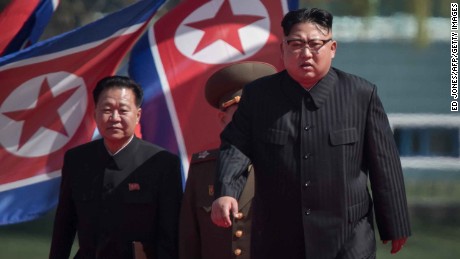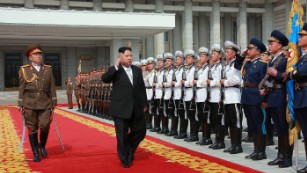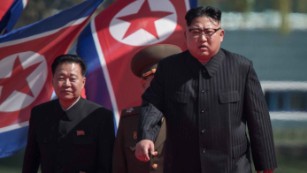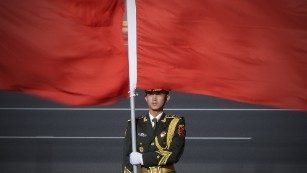South Korean military: North Korea launches ballistic missile
North Korea launched a ballistic missile from the northwestern part of the country early Sunday, the South Korean Joints Chief of Staff said.
This is the first provocative move from North Korea since South Korean President Moon Jae-in took office. Moon has advocated dialogue with North Korea to denuclearize.
South Korea held a meeting of its national security council, the President's office said.
Moon called the missile test a violation of UN Security Council resolutions and a severe challenge to the peace and security of the Korean peninsula and the world, Presidential spokesman Yoon Young-chan said.
South Korea needs to show the north that even though talks are possible, it will only be possible if North Korea changes its attitude, the President told staff at the meeting.
He said South Korea will respond to provocations.
Moon asked for a review of a missile system that is being developed to protect South Korea.
"Our military is closely monitoring for provocative movements by North Korea and is maintaining all readiness postures," a statement from the military said.
700-kilometer flight
The missile, launched near the city of Kusong, flew 700 kilometers (435 miles), the South Korean military said. A US defense official confirmed that it flew that far, but said the US is still assessing what type of missile it was.
"At this point, we see nosthing consistent with an (intercontinental ballistic missile) launch," a second defense official told CNN.
The missile launch could also be seen as an insult to Beijing. China remains one of North Korea's only allies and is responsible for much of the heavily-sanctioned nation's economy.
Report: North Korean diplomat open to US talks 'under the right conditions'
On Saturday, Chinese leader Xi Jinping launched a major trade and infrastructure project with multiple world leaders in Beijing. A North Korean delegation attended the conference.
Condemnation from Japan
The missile landed in waters between the Korean Peninsula and Japan, according to a statement from the Japanese government.
Japanese Prime Minister Shinzo Abe condemned the launch in a quick doorstep interview with reporters.
"Despite strong warning from the international community, North Korea launched a ballistic missile again," Abe said. "This is totally unacceptable and we strongly protest it. North Korea's missile launch is a serious threat to Japan and clearly violate against the UN resolution."
North Korea wants South's spy chief extradited over alleged Kim plot
Chief Cabinet Secretary Yasuhide Suga said the government didn't initiate a "J alert," a nation-wide alert system for missile launches. He added that the missile didn't come down in Japan's exclusive economic zone, waters within 322 kilometers (200 miles) of the coast for which it has jurisdiction over resources.
Prior launches
The projectile launch comes two weeks after a ballistic missile test that South Korean and US officials said failed.
That missile, launched April 29, blew up over land in North Korean territory, according to a spokesman for the US Pacific Command.
China's new world order: Xi, Putin and others meet for Belt and Road Forum
North Korea has previously attempted at least nine missile launches on six occasions since US President Donald Trump was inaugurated in January. Some of those missiles reached the Sea of Japan, also known as the East Sea. Sunday's launch, however, was near the west coast.
Though tensions between the United States and North Korea have been higher than usual over the past few months, a senior North Korean diplomat told South Korea's Yonhap news agency on Saturday that Pyongyang is open to talks with Washington "under the right conditions."
Earlier this month Trump said he would be willing to meet North Korean leader Kim Jong Un "under the right circumstances."
No sitting US president has ever met with the leader of North Korea while in power, and the idea is extremely controversial.
Kim's regime has sought to advance its nuclear and ballistic missile programs. The Trump administration has made a show of force in the region to deter those programs' development.
National security adviser H.R. McMaster briefed the President by phone on Saturday about the missile launch, a senior White House official said.
News Courtesy: www.cnn.com














